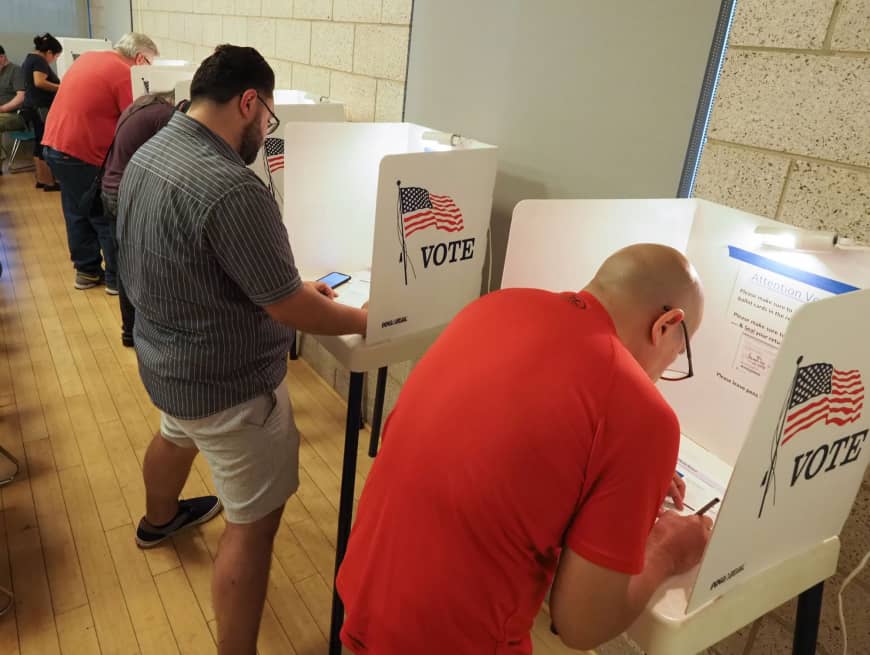
The U.S. midterm elections saw a divided America as Republicans deepened their hold on the Senate while Democrats took over the House as many pundits predicted. Voter interest and participation were high but exit polling of top concerns amongst voters bears little fruit for the Iran lobby or the mullahs in Tehran who were hoping for signs that a blue wave might help bring down new economic sanctions.
According to most exit polls by news organizations, Americans cited healthcare and immigration as their two biggest concerns with the economy following up in third place. The plight of the mullahs was not high on anyone’s list of concerns.
The political environment is dramatically different than it was in 2014-15 when the Obama administration committed itself fully to pushing through a nuclear deal with Iran no matter the cost and that cost was high coming in the form of billions of dollars in cash, sanctions relief and removal of conditions that allowed Iran to develop long-range ballistic missiles, sponsor terrorism across Europe and start two wars in Syria and Yemen.
That deal was sold by the Obama administration and supported by the Iran lobby’s “echo chamber” on the idea that Iran was headed towards a more moderate course and was receptive to diplomacy and wanted to rejoin the community of nations.
Unfortunately for the Iran lobby, the Iranian regime’s actions since then has blown those ideas out of water. It also didn’t help advocates such as the National Iranian American Council that as recently as this summer and last month, Iranian intelligence services were foiled in attempts to bomb a gathering of Iranian dissidents outside of Paris and assassinate another in Denmark.
Any hope Iran could be perceived as a moderating force was literally blown out of the water leaving the Iran lobby to scramble for any rhetorical foothold with the U.S. media.
Since the knee-capping the Trump administration has given to the Iranian regime through the withdrawal from the nuclear deal, the re-imposition of economic sanctions and efforts to build a consensus among key allies to no longer import Iranian oil, the Iran lobby has cast about wildly to find any topic that might stick and help Tehran.
The NIAC has sought to attack the Trump administration on its immigration policies. That went nowhere and in retrospect did not earn the Iran lobby any favors amongst Americans concerned about the issue.
The NIAC sought to float the idea that the Iranian people would be hurt and not the government. That idea also didn’t fly since the suffering of the Iranian people at the hands of their own government has been well-documented over the past year with violent and widespread demonstrations by Iranians.
The NIAC then tried to mock the president for his recent “Game of Thrones” meme and outside of social media didn’t move the needle in the midst of the midterm elections.
In short, few Americans give a hoot about anything the NIAC has to say. It’s a mighty fall from the heady days of unobstructed access to the White House and State Department previously enjoyed by NIAC officials during the Obama years.
The NIAC is now finding itself playing a game of political “Survivor” as it stands outside the flow of American politics on a lonely island waving its arms and calling desperately for any journalist to pay attention to itself.
All of which raises an interesting question: Is the Iran lobby even worth keeping around anymore by the mullahs?
If the NIAC has outlived its usefulness to Tehran and has never been fully engaged on issues of real concern to the Iranian-American community then where does it go from here?
This may explain why its founder, Trita Parsi, got out of Dodge and quit the NIAC to pursue a more independent path and Jamal Abdi has been left to try and figure out how to keep the increasingly irrelevant movement afloat.
Abdi has tried to take credit for the midterm election results by issuing a statement denouncing Republicans who lost their seats and trumpet it as a movement back towards Iranian engagement.
“Across the country, candidates dedicated to overturning Trump’s outrageous and discriminatory Muslim ban and stopping war with Iran won big. To have a check on Trump is a huge victory for the Iranian-American community, our country and the global community,” Abdi said.
It’s worth noting that Abdi focused on opposition to the administration’s immigration policies and opposing war with Iran, but made no mention of Iran’s horrific human rights record, its abuse of Iranian women or the sponsorship of terrorism in France and Denmark.
He goes on to mention the backing of several candidates, but it remains to be seen if any of them are going to heed the NIAC’s call to place Iran back at the top of the foreign policy agenda in terms of moving diplomacy forward when the mullahs seem only intent on killing as many Iranian dissidents as possible both inside and outside of Iran.
There may come a time in 2020 when endorsement by the NIAC will become as desirable as an endorsement by the KKK.